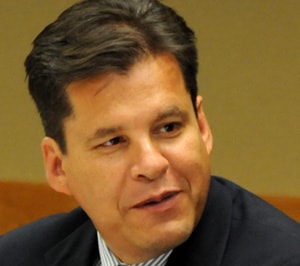
Rep. Joseph Cervantes (Photo by Heath Haussamen)
The sponsor of a 2009 bill that opened legislative conference committees to the public says that legislation has increased transparency in the Roundhouse.
“While a number of opponents reasonably believed opening conference committees would drive lawmaking deeper into the shadows, it has had the opposite result,” said State Rep. Joseph Cervantes, D-Las Cruces.
Cervantes’ primary argument for opening legislative conference committees – a battle he fought for years until he won in 2009 – was that legislative leaders used secret committees to keep other lawmakers in the dark about what was happening.
That no longer happens, Cervantes said.
“With increased transparency, the necessary compromises now more likely take place on the floors of the House and Senate, where all legislators can participate,” he said. “The practice of slipping hidden amendments into legislation and the budget at the last minute is now in the past.”
Conference committees are convened to help resolve differences between versions of bills that have passed both the House and Senate. Three members from each chamber are appointed by leaders to come up with compromise.
Until Cervantes’ legislation to open the meetings was signed by then-Gov. Bill Richardson in 2009, those meetings were held in secret, and the full House and Senate often had to vote on changes made in conference committees during the final chaotic days of the session, without time to scrutinize the changes.
Now, because those meetings are open and the media often attends them, there’s less opportunity to quietly make changes to bills. In fact, there are simply fewer conference committees being held, Cervantes said, because they can’t be used to secretly bypass the legislative process as they were in the past.
There were two conference committees held in the session that ended last month. One was on a bill that would have dealt with a state law that allows undocumented immigrants to obtain driver’s licenses. That meeting ended without resolving differences between the House and Senate, so the bill died.
The other conference committee, on a bill that expands the state’s DNA collection law, resulted in a compromise bill the governor signed into law today.
Activist encouraged by Cervantes’ words
Sarah Welsh, director of the N.M. Foundation for Open Government, was heartened by Cervantes’ claim.
“That’s very encouraging to hear, particularly from someone who’s on the floor, participating in these debates,” she said. “Up in the peanut gallery, I’ve heard rumblings to the opposite effect – that opening up conference committees was meaningless, since the real deals are just hammered out in caucus or in small leadership meetings.”
Welsh pointed out that both chambers’ finance committees met behind closed doors at least once during the recent session, which “raised a few eyebrows.”
“But if Cervantes senses a change for the better, we should put a great deal of stock in that,” she said.
“I haven’t been around long enough to have any personal opinion on whether or how things have changed,” Welsh added. “My only first-hand impression is that last year I remember interminably long caucus meetings while the budget was being hammered out. This year’s caucus meetings have been short and less frequent. And many of the floor debates have been substantive and fascinating to watch.”
